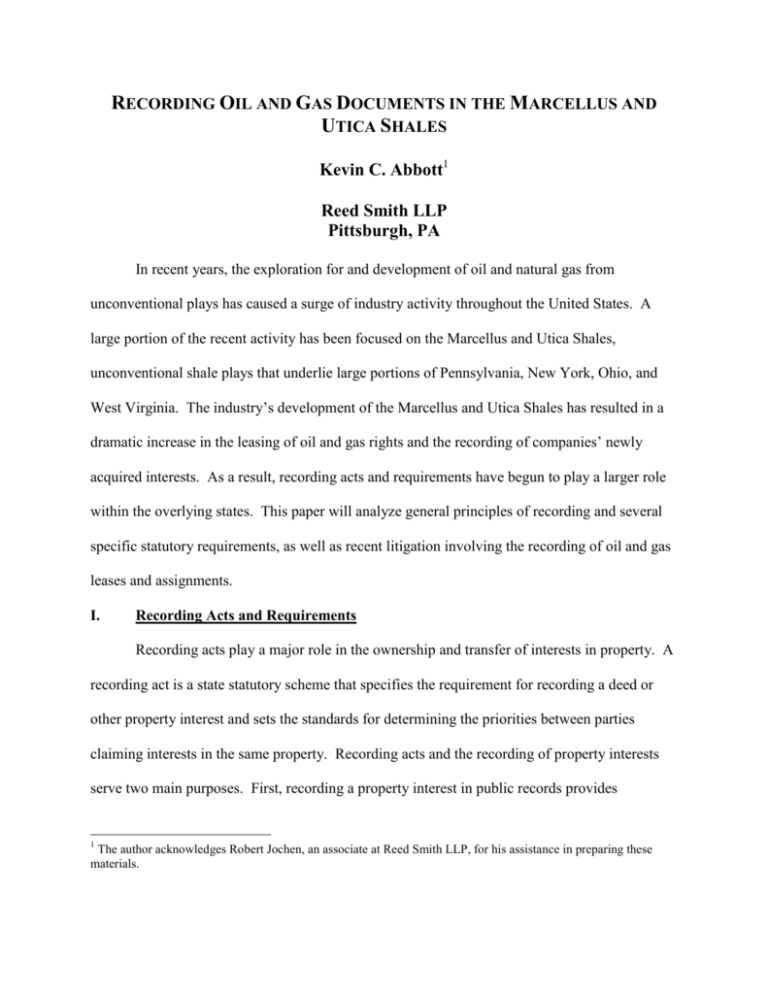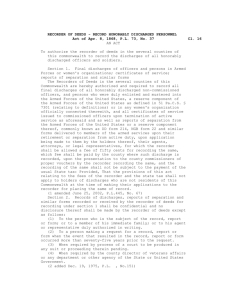Kevin C. Abbott Reed Smith LLP Pittsburgh, PA
advertisement

RECORDING OIL AND GAS DOCUMENTS IN THE MARCELLUS AND UTICA SHALES Kevin C. Abbott1 Reed Smith LLP Pittsburgh, PA In recent years, the exploration for and development of oil and natural gas from unconventional plays has caused a surge of industry activity throughout the United States. A large portion of the recent activity has been focused on the Marcellus and Utica Shales, unconventional shale plays that underlie large portions of Pennsylvania, New York, Ohio, and West Virginia. The industry‟s development of the Marcellus and Utica Shales has resulted in a dramatic increase in the leasing of oil and gas rights and the recording of companies‟ newly acquired interests. As a result, recording acts and requirements have begun to play a larger role within the overlying states. This paper will analyze general principles of recording and several specific statutory requirements, as well as recent litigation involving the recording of oil and gas leases and assignments. I. Recording Acts and Requirements Recording acts play a major role in the ownership and transfer of interests in property. A recording act is a state statutory scheme that specifies the requirement for recording a deed or other property interest and sets the standards for determining the priorities between parties claiming interests in the same property. Recording acts and the recording of property interests serve two main purposes. First, recording a property interest in public records provides 1 The author acknowledges Robert Jochen, an associate at Reed Smith LLP, for his assistance in preparing these materials. constructive notice to all persons as to the state of title in property. Second, the public recording of property interests protects subsequent purchasers against fraudulent conveyances by parties that do not actually own any legal rights or interests in the property. Recording acts also set the standards for determining the priority of competing interests in the same piece of property. Recording acts are classified as either “notice statutes” or “racenotice statutes.” A notice statute grants priority of interest to the party with the most recently obtained, valid claim that was purchased without notice of any prior interest in the property. For example, an Ohio statute provides that until a deed or other instrument is recorded, it is fraudulent and ineffective against a subsequent bona fide purchaser that lacked notice of the prior interest at the time of purchase.2 Thus, a subsequent bona fide purchaser would be granted priority over earlier unrecorded claims. Under a race-notice statute, priority of title is granted to the party that first records an interest in property without notice of prior unrecorded claims. For example, a Pennsylvania statute provides that a deed or other instrument is only effective against subsequent deeds or instruments purchased without notice if it is recorded before the second deed or instrument.3 A. Administration of Recording Acts Although recording acts are state statutory schemes, the acts are often administered by recording officers at the county level. The recording officers can be statutorily or even constitutionally created positions. The officers play a significant role as they are responsible for recording and properly indexing all of the documents presented for recording. However, the 2 Ohio Rev. Code § 5301.25. See also W. Va. Code § 40-1-9 (providing that an unrecorded interest is void as against a subsequent purchaser that purchased the interest without notice of the earlier claim). 3 21 P.S. § 351. See also N.Y. Real Prop. Law § 291 (providing that an unrecorded interest is void as against a subsequent purchaser that purchased the interest without notice of the earlier claim and first records their interest). -2- officers‟ roles are also limited and have often been described as being only ministerial in nature. For example, in MERSCORP, Inc. v. Romaine¸4 a plaintiff sought an order to compel a county recording officer to record and index the mortgages, assignments and discharges that it had presented.5 The county recording officer claimed that because the plaintiff had no interest in the mortgages that were presented, the documents were not conveyances and could not be recorded.6 The Court of Appeals of New York held that the county recording officer had a “ministerial duty of recording and indexing instruments affecting real property[,]”7 and lacked any statutory authority to look beyond whether a document satisfies the state‟s limited recording requirements.8 The Court of Appeals‟ holding that recording officers‟ duties are limited and only ministerial in nature is consistent with precedent out of other jurisdictions.9 B. Documents Entitled to be Recorded Recording acts generally include broad, inclusive language meant to include any instrument affecting interests in land. In Pennsylvania, all deeds, contracts, and other instruments of writing intended to sell or convey an interest in land are entitled to be recorded. 10 4 861 N.E.2d 81 (N.Y. 2006). 5 Id. at 82. 6 Id. at 83. 7 Id. at 83-84. 8 Id. at 84. The Court of Appeals of New York upheld the grant of mandamus relief requiring the county clerk to accept the documents for recording. 9 See¸e.g.¸ Ramsey v. Riley¸ 13 Ohio 157 (1844) (holding that it is county recorder‟s duty to record all documents required to be recorded, but not to determine the validity of the documents presented or whether they are genuine or forged); Woodward v. Bowers, 630 F.Supp. 1205, 1207 (M.D. Pa. 1986) (“[T]he Recorder is a ministerial officer charged with recording all documents presented to him”; “[t]he Recorder is truly just a „custodian‟ of documents”); Mayers v. Riley, 465 F.2d 630, 658 (D.C. Cir. 1972) (describing the Recorder as, “the cold steel safety deposit box of the real estate industry” and stating that he “merely preserves the documents.”). 10 See 21 P.S. § 351; see also N.Y. Real Prop. Law § 291; Ohio Rev. Code § 317.08; W. Va. Code § 39-1-2. -3- The Supreme Court of Pennsylvania has consistently held that the language of its recording act includes all writings conveying an interest in real property: It is stated . . . with reference to recording acts: “the tendency of the courts is to give them an efficient operation, by regarding them as authorizing the record of almost every instrument of a character to affect the title to land.” This court has consistently followed this practice . . . . The word “interest” is the broadest term applicable to claims in or upon real estate, and in its ordinary signification among men of all classes it is broad enough to include any right, title or estate in real estate . . . .11 This rule has even been applied so broadly as to bring articles of marriage within the scope of the recording statutes.12 In addition, a memorandum of a lease may be recorded in lieu of the lease itself so long as the memorandum provides information such as the names and addresses of the parties, the effective date and commencement date of the lease, and a description of the leased premises.13 Oil and gas leases have traditionally been included within the broad, inclusive language typically used in recording acts and have been recorded along with deeds and other instruments.14 Ohio‟s recording act goes further and specifically provides that all oil and gas leases, and assignments of oil and gas leases, may be recorded.15 11 Pa. Range Boiler Co. v. City of Philadelphia, 23 A.2d 723, 726 (Pa. 1942) (internal citations omitted). See also Brotherton v. Livingston, 1842 WL 4712, *3 (Pa. 1842) (recording statutes not limited to deeds, but rather apply to all writings related to real property interests); Shortz v. Unangst, 1841 WL 4235, *9 (Pa. 1841) (the term “writing” in the 1775 recording act was intended to apply to all documents, no matter what title was given to the document, that “pass or create an interest or right of some kind in land . . . .”). 12 See Foster v. Whitehill, 1797 WL 741, *2 (Pa. 1797). 13 See 21 P.S. § 405; N.Y. Real Prop. Law § 291-c. 14 See Lesnick v. Chartiers Natural Gas Co., 889 A.2d 1282, 1284 (Pa. Super. Ct. 2005) (finding that oil and gas leases are statutorily required to be recorded in Pennsylvania and have been regularly recorded since at least the 1890s). See also City Bank of Bayonne v. Hocke, 153 N.Y.S. 731 (N.Y. App. Div. 1915) (holding that a lease in excess of three years is entitled to be recorded). 15 See Ohio Rev. Code § 5301.09. In fact, oil and gas leases are only valid as between the grantor and grantee until the lease has been recorded. Id.; see also Mark v. Rushville Oil & Gas Co., 20 Ohio Cir. Dec. 799 (Fairfield 1908). In order to be recorded, the oil and gas lease must refer to the volume and page number to the deed under which the lessor claims title; however, the failure to include the reference cannot serve as grounds to invalidate or reject the Continued on following page -4- C. Indexing Requirements In addition to accepting and recording deeds and other documents, county recording officials are often required to maintain a number of recording indexes. A recording index is a separate document that is maintained as a reference for locating the books and pages in which deeds and other instruments are recorded. As deeds and other instruments are submitted, county recording officers are required to enter the documents within the records and indexes at the time and in the order in which the documents are received.16 The immediate recording and indexing of documents as they are presented may play a large role in jurisdictions that have race-notice statutes and grant priority to the party that first records a document without notice. Although all four of the states overlying the Marcellus and Utica Shales require the recording officers to maintain indexes of the documents received, the number and type of indexes that must be maintained varies. In Pennsylvania, a recorder of deeds is required to keep both a “direct index,” in which the documents are listed alphabetically by the grantor‟s name, and an “ad sectum index,” in which the documents are listed alphabetically by the grantee‟s name.17 The county clerks of New York are also required to maintain two separate indexes, one for mortgages or securities in the nature of mortgages, and a second index for conveyances and Continued from previous page lease. Ohio Rev. Code § 5301.011. Further, a lessee is required to release all oil and gas leases upon their expiration. Id. at § 5201.09. 16 See 16 P.S. § 9731 (providing that every document must be recorded according to the priority it was presented); N.Y. Real Prop. Law § 317 (providing that all documents are to be recorded at the time of delivery and in the order in which they are received); Ohio Rev. Code § 317.13 (providing that documents are to be recorded in the order in which they are received and are to note the date and exact time at which the document was presented for recording). 17 16 P.S. § 9851. -5- other instruments not intended to be mortgages.18 In West Virginia, clerks of the county courts may be required to maintain separate record books for a number of documents including deeds, judgment liens, or marriage records, but are only required to maintain one general index for all of the record books kept within the county.19 The general index is similarly required to list the names of grantors and grantees, and may also include any additional information that the clerks believe to be necessary or proper.20 In Ohio, county recorders may be required to maintain both alphabetical indexes and sectional indexes of recorded documents.21 Direct alphabetical indexes index documents under the name of the grantor, while indirect alphabetical indexes index documents under the name of the grantee.22 County boards of commissioners may also require county recorders to maintain “sectional indexes” that index documents in terms of the individual parcels located within a county.23 All deeds, leases, and other documents that affect an individual parcel are listed in reference to the parcel, and not in reference to the parties involved.24 Sectional indexes can therefore provide a more readily accessible picture of the ownership interests in a particular parcel. 18 N.Y. Real Prop. Law § 316 (providing that the county clerks must maintain two indexes and that both indexes must contain two lists in alphabetical order: one containing the grantor‟s or assignor‟s name followed by the grantee‟s name, and one containing the grantee‟s or assignee‟s name followed by the grantor‟s name). 19 W. Va. Code § 39-2-1. 20 Id. 21 Ohio Rev. Code § 317.18; Ohio Rev. Code § 317.20. 22 Ohio Rev. Code §317.18. 23 Ohio Rev. Code § 317.20. 24 Id. -6- D. Acknowledgements and Certificates of Acknowledgement Recording acts also require that all deeds and other documents must be properly acknowledged prior to being admitted for recording. An acknowledgement is a declaration in front of a designated official that the declarant is the person identified in the document and that the declarant freely signed the document. Officials that are authorized to receive acknowledgments are designated within the recording acts and typically include notaries, justices of the peace, judicial officials, and other local officials.25 After receiving the declaration, the officer then executes a separate document, known as a certificate of acknowledgement, which confirms that the document was properly acknowledged. Certificates of acknowledgment can take a number of different forms as may be required by statute, 26 and are typically attached to and recorded with the original document. The use of a notary public to acknowledge a document may place additional burdens on the proper execution of a certificate of acknowledgment. Notaries are typically required to keep a notarial seal to be used in acknowledging all official documents.27 Traditionally, embossers were used to affix the notarial seal; however, rubber stamps have become much more common. In addition to an official seal, a notary must provide additional information including his or her 25 See generally 21 P.S. § 291.2 (specifying officials within the Commonwealth that may acknowledge documents); 21 P.S. § 291.3 (specifying officials outside of the Commonwealth); 21 P.S. § 291.4 (specifying officials outside of the United States); N.Y. Real Prop. Law § 298 (specifying officials inside and outside of New York that may accept acknowledgements); N.Y. Real Prop. Law § 299-a(1) (providing that an acknowledgement may be received by an official outside of New York so long as the acknowledgement meets certain requirements); Ohio Rev. Code § 5301.01 (specifying officials that may accept acknowledgements); W. Va. Code § 39-1-3 (specifying officials that may accept an acknowledgement). 26 See generally 21 P.S. § 291.7 (identifying five separate forms in which a certificate of acknowledgement can be executed depending on the parties involved); W. Va. Code § 39-1-4 (standard form of certificate of acknowledgement); W. Va. Code § 39-1-5 (acknowledgement by husband and wife); W. Va. Code § 39-1-9 (acknowledgement by corporation). 27 57 P.S. § 158(a); Ohio Rev. Code § 147.04; W. Va. Code § 29C-4-102 (requiring a notary to affix his or her official seal on every notarial certificate). -7- name, office address, and the date on which his or her commission expires.28 Although none of the statutes specify the exact location in which the notarial seal and additional information must be placed, the seal and information should be placed near the notary‟s signature and in such a way as to allow for photographic reproduction. Today, deeds and other documents may be scanned and stored electronically or on microfilm in order to save space and preserve the documents‟ integrity. Therefore, modern recording acts typically require that all deeds and documents are submitted in a form and quality capable of photographic reproduction.29 E. Real Property Transfer Taxes All four of the Marcellus and Utica Shales states impose a tax on the transfer or sale of real property and require that a form stipulating the amount of compensation to be paid is filed with the state.30 A state official such as an auditor or the recording officer uses the reported amount to compute the amount of tax liability for the sale. The grantor is typically responsible for the payment of the transfer tax, but liability may be transferred to the grantee if the grantor fails to pay.31 A transfer or sale cannot be recorded until the tax is paid, and some states impose fines and other penalties on recorders that accept documents that fail to comply with the tax. 28 57 P.S. § 158(a); N.Y. Exec. Law § 137; Ohio Rev. Code § 147.04; W. Va. Code § 29C-4-102. 29 57 P.S. § 158(b) (providing that the notarial seal must be placed in a prominent place capable of photographic reproduction); W. Va. Code § 29C-4-102 (providing that information to be included by notary must be placed so that the information is capable of photographic reproduction); see also, Ohio Rev. Code § 317.112 (providing that a document presented for recording must be sufficiently legible so that it may be reproduced). 30 See 72 P.S. § 8102-C.(b) (imposing a state tax equal to one percent of the value of the transaction); N.Y. Tax Law § 1402 (imposing a state tax on all transactions in excess of five hundred dollars equal to two dollars for every five hundred dollars of consideration paid); Ohio Rev. Code § 322.02 (imposing a state tax not to exceed thirty cents for every one hundred dollars of consideration paid); W. Va. Code § 11-22-2 (imposing a state tax equal to one dollar and ten cents for every five hundred dollars of consideration paid and allowing counties to charge an equal tax on the same transaction). 31 N.Y. Tax Law § 1404; see also Ohio Rev. Code § 322.02 (providing that the transfer tax must by paid by the grantor at the time the deed is transferred between the parties). -8- II. The Chesapeake Appalachia, LLC v. Golden Decisions Recent opinions out of Pennsylvania serve as valuable illustrations as to the types of issues that may arise as oil and gas companies acquire interests and seek to record them. In 2010, Chesapeake Appalachia, LLC filed a civil complaint against Ginger Golden, the Wayne County Recorder of Deeds (the “Recorder”), seeking declaratory, injunctive and mandatory relief. The dispute centered on Chesapeake‟s attempts to record oil and gas leases, memorandums of leases and assignments of leases in Wayne County. The case resulted in two Court of Common Pleas‟ opinions and one opinion from the Commonwealth Court of Pennsylvania. This section will provide an analysis of the recording requirements at issue in the dispute between Chesapeake and the Recorder, as well as the opinions issued in all three decisions. A. Chesapeake Appalachia, LLC v. Golden I32 The Court of Common Pleas of Wayne County issued its first opinion in the dispute between Chesapeake and the Recorder on November 24, 2010. Before the Court were the parties‟ cross-motions for judgment on the pleadings. In her motion, the Recorder sought an order declaring that she was acting within her statutory authority when she rejected a number of leases and assignments of leases for alleged defects. Chesapeake sought an order declaring that its documents were entitled to be recorded and an order requiring the Recorder to accept and record its documents as presented. Chesapeake also sought an order for mandamus relief to compel the Recorder to accept and record the documents that the Recorder had previously rejected. The Court of Common Pleas classified the Recorder‟s rejections into six categories: 1. an inability to index; 2. an invalid acknowledgement or certificate of acknowledgement; 3. an 32 Chesapeake Appalachia, LLC v. Golden, No. 479-Civil-2010 (Pa. Ct. Com. Pl. Wayne Nov. 24, 2010). -9- inability to scan; 4. the content of the documents; 5. defective statement of value forms; and 6. re-recording with an additional name. 1. Inability to Index The most contentious issue addressed in the November 24 Opinion was the Recorder‟s duty to record and index Chesapeake‟s assignments of multiple leases (also called “blanket assignments” or “multiple lease assignments”). Chesapeake sought to record four assignments which assigned over 200 leases. In Pennsylvania, all deeds and other instruments intended to sell or convey any land or interests located within Pennsylvania are entitled to be recorded. 33 Chesapeake argued that because oil and gas leases convey a fee simple determinable interest in land,34 Pennsylvania considers oil and gas leases to be transfers of realty that are entitled to be recorded.35 Chesapeake further argued that because assignments of oil and gas leases convey some or all of the lessee‟s interests to the assignee, assignments are also transfers of realty that are entitled to be recorded. The Recorder claimed that although she had accepted assignments of multiple leases in the past, her current computer system made it burdensome and impractical to properly record the assignments. The Court of Common Pleas noted that this was “perhaps the most contested” issue between the two parties and found that additional discovery would be necessary as to the parties‟ rights related to the recording and indexing of those assignments. As 33 Pa. Range Boiler Co., 23 A.2d at 726 (Pa. 1942) (recording statutes are to be interpreted broadly and are intended to entitle every document that affects title to land to be recorded). See also Brotherton, 1842 WL 4712, at *3 (Pa. 1842) (recording statutes not limited to deeds, but rather apply to all writings related to real property interests); Shortz, 1841 WL 4235, at *9 (Pa. 1841) (the term “writing” in the 1775 recording act was intended to apply to all documents, no matter what title was given to the document, that “pass or create an interest or right of some kind in land . . . .”); Council Rock School District v. Land in Northampton Twp., 46 Pa. D. & C. 2d 245, 247 (Pa. Ct. Com. Pl. Bucks 1968) (finding that a writing is fit for recording if it touches or concerns real estate). 34 See Brown v. Haight, 255 A.2d 508 (Pa. 1969). 35 Lesnick, 889 A.2d at 1284. - 10 - a result, the Court denied both motions for judgment on the pleadings. That issue was the sole issue resolved in the second and third Golden opinions. 2. Invalid Acknowledgement or Certificate of Acknowledgement The Recorder had also rejected a number of leases based upon alleged flaws in the certificates of acknowledgement and upon allegations that some acknowledgments were improperly received. The Recorder had rejected a number of leases because the signature of the lessor did not exactly match the name in the body of the lease (e.g., where a middle initial appeared in the text but not in the signature) and because the lessor did not execute the lease in another name that the lessor was known by (e.g., where the text identified the lessor as “A/K/A” but the signature did not include the A/K/A designation). Under Pennsylvania law, a recorder of deeds is required to accept and record all properly acknowledged documents that convey real estate or interests in oil and gas rights.36 Chesapeake asserted that the officer receiving an acknowledgement is responsible for ensuring the signatory party‟s identity37 and that the Recorder is simply tasked with entering the documents in the public record. The Court agreed that the official making the acknowledgment was responsible for confirming the declarant‟s identity and that the designation of “a/k/a” clearly implied that the person before the officer was the same person whose name preceded the “a/k/a.”38 The Court held that the Recorder‟s 36 See 21 P.S. § 351 (providing that all instruments of writing that are intended to grant, bargain, sell, or convey any lands in Pennsylvania shall be recorded in the office for the recording of deeds “upon being acknowledgment by the parties executing the same”); see also 21 P.S. § 356 (providing that all instruments purporting to convey rights and privileges in real property within Pennsylvania “shall be acknowledged” and recorded in the county recorder of deeds‟ office); Lesnick, 889 A.2d at 1284 (finding that oil and gas leases are in fact transfers of realty and are entitled to be recorded). 37 See In re Messinger, 281 B.R. 568, 574 (M.D. Pa. Bankr. 2002) (under Pennsylvania law, notary‟s certificate is prima facie evidence of due execution); Sheaffer v. Baueringer, 29 A.2d 697, 699 (Pa. 1943) (notary‟s acknowledgement is “prima facie evidence” of execution). 38 Golden, No. 479-Civil-2010, at *8-*9 (Pa. Ct. Com. Pl. Wayne Nov. 24, 2010). - 11 - rejection of a document with a certificate of acknowledgement that satisfied statutory requirements was a violation of the Recorder‟s obligation under Pennsylvania law,39 and granted Chesapeake‟s motion for judgment on the pleadings and order for mandamus relief compelling the Recorder to accept the affected leases.40 The Recorder had also rejected a number of leases because of alleged defects in the notary‟s execution of the certificates of acknowledgment. In two of Chesapeake‟s leases, the notary‟s signature failed to exactly match her typed name. The Court of Common Pleas held that a notary‟s signature was statutorily required to match the name appearing on the notarial seal and the leases were therefore properly rejected.41 A third lease had also been rejected because the notarial seal was not in the location favored by the Recorder. In Pennsylvania, a notarial seal is required to be placed in a prominent place near the notary‟s signature in a manner that is capable of being photographically reproduced.42 However, there is no requirement that a notary‟s seal must be placed in a specific location. The Court held that the placement of the notary‟s seal satisfied statutory requirements and, although the notary‟s seal was not “in the location desired by the Recorder,” the Recorder was statutorily obligated to record the third lease as it had been presented.43 39 Id. at *8. 40 Id. at *9. 41 Id. 42 57 P.S. § 158(b). 43 Golden, No. 479-Civil-2010, at *9-*10 (Pa. Ct. Com. Pl. Wayne Nov. 24, 2010). - 12 - 3. Inability to Scan The Recorder had also rejected a number of other leases for similar reasons. The Recorder had rejected multiple leases because she claimed that they were incapable of being photographically reproduced as required by statute.44 The Court noted that although notaries are no longer required to use an embosser, a number of notaries still use embossers to authenticate official documents.45 The Court found that although it had “no trouble” reading the notarial seals as they had been affixed to the rejected leases, the seals may not have been legible if scanned for storage in the Recorder‟s office.46 The Court held that because there was a factual dispute as to the whether or not the notarial seals would be legible after being scanned, Chesapeake was not entitled to judgment on the pleadings or mandamus relief.47 This issue was later rendered moot because the Recorder successfully scanned the documents after Chesapeake resubmitted them. 4. Content The Recorder had also rejected a number of leases based on their contents. For example, the Recorder had rejected leases that failed to note deed book references to agricultural easements or failed to include an addendum that had been mentioned in the lease. In Pennsylvania, the Recorder is not responsible for analyzing the contents or validity of a lease. 48 In fact, it has been held that a recorder of deeds‟ review of documents for recording is “far from active, knowing and purposeful,” and that the recorder does not need to know the contents of the 44 See 57 P.S. § 158(b). 45 Golden, No. 479-Civil-2010, at *10 (Pa. Ct. Com. Pl. Wayne Nov. 24, 2010). 46 Id. at *10-*11. 47 Id. at *11. 48 Albright v. B. & G. Dev. Co., Inc., 64 Pa. D. & C.2d 595, 600 (Pa. Ct. Com. Pl. Dec. 31, 1973). - 13 - documents that he or she receives.49 The Court held that the Recorder‟s assessment as to the “validity of the instrument is confined to the acknowledgment. The Court can find no authority granting a Recorder of Deeds broader powers.”50 The Court of Common Pleas held that the Recorder cannot impose requirements other than those included in the recording statutes: This Court has no doubt that it would be consistent with best practice if each and every document presented for recording complied with each and every condition documented upon the Recorder of Deeds‟ cover sheet. The Recorder‟s careful scrutiny of documents submitted for recording is commendable and is affirmed. At the same time, if a document which comports with the law and presented for recording is rejected, it not only violates the Recorder‟s duties, no matter how well-meaning the intention, and places the parties to the instrument at risk.51 The Court held that the “mere review of the numbered pages” constitutes the unauthorized review of the contents of a document, and granted judgment on the pleadings and mandamus relief in favor of Chesapeake as to the leases rejected for their content.52 5. Defective Statement of Value Forms The Recorder had also rejected a number of leases due to alleged defects in the statement of value forms attached to the documents. In Pennsylvania, a realty transfer tax is assessed on all sales of property.53 In order to determine the amount of the tax to be imposed, the parties must provide a statement of value form specifying the amount of compensation to be paid.54 A recorder of deeds may be subject to fines or other penalties for accepting a document that fails to 49 Woodward, 630 F. Supp. at 1208. 50 Golden, No. 479-Civil-2010, at *6 (Pa. Ct. Com. Pl. Wayne Nov. 24, 2010). 51 Id. at *8. 52 Id. 53 72 P.S. § 8102-C. 54 Id. - 14 - specify the consideration to be paid.55 The Court therefore held that the Recorder properly rejected leases that failed to specify the consideration paid and granted the Recorder‟s motion for judgment on the pleadings.56 6. Re-Recording with an Additional Name Finally, the Recorder had rejected a number of memorandums of leases that were presented for re-recording. Chesapeake had originally recorded the memorandums without executing them and then sought to re-record them after Chesapeake executed the documents. Under Pennsylvania law, recorders of deeds are obligated to record all documents that are properly acknowledged and entitled to be recorded,57 including a memorandum of a lease in lieu of the lease itself.58 The Court found that the memorandums met the recording requirements, as indicated by the fact that they had already been recorded once.59 The Court held that the addition of the lessee‟s signature did not negate its right to have the memorandums recorded and, therefore, the Recorder could not refuse to re-record the memorandums as presented.60 The Court of Common Pleas granted judgment on the pleadings and mandamus relief in favor of Chesapeake, requiring the Recorder to record the re-submitted memorandums.61 55 72 P.S. § 8109-C.(b). 56 Golden, No. 479-Civil-2010, at *12 (Pa. Ct. Com. Pl. Wayne Nov. 24, 2010). 57 21 P.S. § 404. 58 21 P.S. § 405. Pennsylvania law requires that a memorandum recorded in lieu of the lease itself must include information such as the names and addresses of the parties, a description of the leased premises, applicable dates, and certain rights granted in the lease. Id. However, the memorandum is not required to state the rates of compensation or overall compensation granted pursuant to the lease. See id. 59 Golden, No. 479-Civil-2010, at *12 (Pa. Ct. Com. Pl. Wayne Nov. 24, 2010). 60 Id. 61 Id. - 15 - B. Chesapeake Appalachia, LLC v. Golden II62 The second Opinion issued by the Court of Common Pleas of Wayne County focused solely on the Recorder‟s rejection of Chesapeake‟s assignments of multiple leases. The issue was before the Court on cross-motions for summary judgment as the parties had taken additional discovery following the Court of Common Pleas‟ November 24 Opinion. The sole issue before the Court in its April 21 Opinion was “whether the Recorder of Deeds [was] authorized to establish policies which, by their enforcement, effect a rejection of an otherwise recordable document, in this case a blanket assignment of multiple leases.” Following its analysis, the Court held that the Recorder was required to record assignments of multiple leases and was precluded from establishing policies that reject documents entitled to be recorded. In its motion for summary judgment, Chesapeake argued that assignments of multiple leases are within the scope of Pennsylvania‟s recording statutes and are therefore entitled to be recorded. Pennsylvania‟s recording statutes require every document related to real property to be recorded,63 and the Pennsylvania Supreme Court has consistently held that the word “„interest‟ is the broadest term applicable to claims in or upon real estate, and in its ordinary signification among men of all classes it is broad enough to include any right, title or estate in real estate . . . .”64 Further, Chesapeake argued that because oil and gas leases are entitled to be recorded,65 and 62 Chesapeake Appalachia, LLC v. Golden, No. 479-Civil-2010 (Pa. Ct. Com. Pl. Wayne Apr. 21, 2011). 63 See 16 P.S. § 9731 (providing for the recording of every deed or writing concerning land); 21 P.S. § 351 (providing for the recording of every deed or other instrument intended to sell or convey any land); 21 P.S. § 356 (providing for the recording of all written agreements related to real property). 64 Pa. Range Boiler Co., 23 A.2d at 726 (Pa. 1942). 65 See Lesnick, 889 A.2d at 1284. - 16 - because assignments convey a lessee‟s interest in the underlying oil and gas leases to the assignee, assignments of oil and gas leases are within the scope of the recording statutes. The Recorder claimed that her policy of indexing assignments of multiple leases in the names of the underlying lessors and lessees affected by the assignments was required by Pennsylvania law. The Recorder argued that upon receiving an assignment of oil and gas leases, she was required to index the assignment of lease by indexing each lessor in the grantor‟s index and each lessee in the grantee index. The Pennsylvania Recorder of Deeds Association also filed a brief as amicus curiae, and argued that the holding of First Citizens National Bank v. Sherwood,66 as well as a subsequently enacted provision, 21 P.S. § 358 which required indexing as to the “parties”,67 supported the Recorder‟s claim that assignments of leases must be indexed as to the underlying lessors and lessees. According to both the Recorder and amicus curiae, the “parties” as to which an assignment must be recorded in order to provide constructive notice are the underlying lessors and lessees, and not just the assignor and assignee. The Court of Common Pleas rejected the arguments of the Recorder and amicus curiae and held that a recorder cannot reject a document that is entitled to be recorded for reasons of “policy.”68 The Court found that, “[i]n case after case the courts have held that the office of the Recorder of Deeds is ministerial and that the Recorder of Deeds may not set policies or standards that enlarge the criteria for recording beyond that criteria set by statute.”69 The Court also found 66 879 A.2d 178 (Pa. 2005) (holding that a properly recorded, but improperly indexed document still provides constructive notice to subsequent purchasers). 67 See 21 P.S. § 358(2) (providing that in order for a document to provide constructive notice, the document must be recorded and indexed properly as to the “party” in the alphabetical indexes). 68 Golden, No. 479-Civil-2010, at *3 (Pa. Ct. Com. Pl. Wayne Apr. 21, 2011). 69 Id. (citing Woodward, 630 F. Supp. at 1207 (“the Recorder is a ministerial officer charged with recording all documents presented to him”; “[t]he Recorder is truly just a „custodian‟ of documents”); Schaeffer v. Frey, 589 A.2d Continued on following page - 17 - that the Sherwood decision, and 21 P.S. § 358, relied upon by the Recorder and amicus curiae actually supported Chesapeake‟s position.70 The Court determined that the term “party” was intended to mean “[o]ne who takes part in a transaction,”71 and, in an assignment, the only parties are the assignor and assignee.72 The Court granted Chesapeake‟s motion for summary judgment and held that it was the Recorder‟s “ministerial duty” to record the assignments and that the Recorder was only required to index the assignments of multiple leases submitted by Chesapeake as to the assignor and assignee.73 The Court did note that the Recorder was permitted to index the assignment as to all lessors but could not use this as a basis to reject the document. C. Chesapeake Appalachia, LLC v. Golden III74 The Recorder appealed the Court of Common Pleas‟ April 21 Opinion to the Commonwealth Court of Pennsylvania. The Recorder argued that mandamus relief should not have been granted because Chesapeake had failed to meet its burden and prove that it was entitled to have its assignments of multiple leases recorded. On appeal, the Recorder conceded that assignments of leases were entitled to be recorded, but argued that Chesapeake had failed to show any statutory duty to accept assignments of multiple leases for recording. The Recorder Continued from previous page 752, 756 (Pa. Super. Ct. 1991) (Recorder is custodian of records and primary duty is to receive and record “any recordable instruments;” the Recorder is not a judicial officer)). 70 Id. 71 Id. (citing BLACK‟S LAW DICTIONARY (7th ed.)). 72 Id. When a lease is assigned in Pennsylvania, a recorder is only required to ascertain and index the name of the grantor (assignor), the name of the grantee (assignee), and the volume and page of the recorded instrument. See 16 P.S. § 9851; see also Penn Title Ins. Co. v. Deshler, 661 A.2d 481 (Pa. Commw. Ct. 1995). 73 Golden, No. 479-Civil-2010, at *5 (Pa. Ct. Com. Pl. Apr. 21, 2011). 74 Chesapeake Appalachia, LLC v. Golden, 35 A.3d 1277 (Pa. Commw. Ct. 2012). - 18 - also argued that a recorder of deeds has an implied authority to reject documents based upon their form. Chesapeake disagreed and reasserted that the recording acts entitle all documents that convey or relate to an interest in property to be recorded, and that a recorder of deeds cannot enact individual policies but must record documents as they are presented. In its Opinion, the Commonwealth Court of Pennsylvania affirmed the Court of Common Pleas‟ decision. The Commonwealth Court found that there was no question that leases and assignments of leases were entitled to be recorded, and that a recorder is required to record the documents as they are presented to her.75 The Court held that Chesapeake had shown a clear legal right to have its assignments of multiple leases to be recorded.76 The Commonwealth Court also rejected the Recorder‟s argument that she was obligated to index the assignments as to each lessor in the underlying leases assigned. The Court found that under principles of statutory construction, the term “party” as used in 21 P.S. § 358(2) referred to the assignor and assignee of the assignment, not all lessors.77 In her appeal, the Recorder asserted two additional arguments against the grant of mandamus relief in favor of Chesapeake. Mandamus is considered to be an extraordinary remedy and is not available when an alternative, adequate remedy is available. According to the Recorder, because Chesapeake was able to record the individual assignments for each of the 75 Id. at 1280. 76 Id. at 1282. 77 Id. Because the assignments did not have to be indexed as to all lessors, neither the Court of Common Pleas nor the Commonwealth Court addressed the Recorder‟s factual contention that her computer system was unable to index multiple lease assignments as to all lessors of the underlying leases. The Commonwealth Court did note her deposition testimony that, even if such a computer system was available, she would not use it because “she was happy with the system [she has] because it works.” Id. In its motion for summary judgment, Chesapeake presented uncontradicted evidence that other counties in Pennsylvania did index assignments of multiple leases as to the underlying lessors and that computer systems capable of doing that were available. - 19 - leases included in the multiple lease assignments, mandamus relief was inappropriate. The Recorder also claimed that public policy interests required assignments to be indexed as to the underlying property owner and would serve to ensure accurate title searches. The Commonwealth Court found both arguments to be unpersuasive, holding that recording individual leases is “not an adequate remedy for a company that has the right to file multiple lease assignments and chooses to do so, but is illegally thwarted in that right.”78 The Court also noted that because Pennsylvania is a race-notice state, giving priority to the party that records its document first without knowledge of another party‟s interest, the Recorder‟s argument was disingenuous at best.79 The Court also held that requiring the Recorder to perform her statutory duty and record assignments of multiple leases accords with public policy.80 III. Conclusion Recording acts and the officers that enforce them play an important role in the ownership of interests related to real property and oil and gas leases. Although recording officers play an important role in the recording process, recording acts must be strictly enforced. Therefore, recording officers must serve only as archivists, and cannot enact policies of their own. 78 Id. at 1283. 79 Id. at 1283 n.15. 80 Id. at 1283. - 20 -





